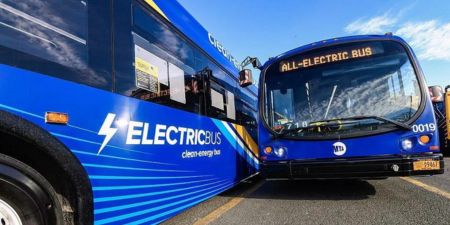
By: Kea Wilson
America would reap massive public health and emissions-reduction benefits from electrifying its bus fleet, a new study confirms — even if we only replace the diesel buses that are too old to run anyway, or focus all our energies on greening the largest cities alone.
Contrary to the weirdly persistent myth that e-buses don’t really cut pollution when you factor in things like the emissions required to produce and charge them, a recent study from Carnegie Mellon University found that electrifying America’s bus fleet could slash between one- and two-thirds of the fleet’s total greenhouse gases over the next 14 years, depending on how quickly we do it.
And the study authors argue there are good reasons to act fast. Aside from greenhouse gases, diesel buses spew a range of toxic PM 2.5 particulates over the dense city neighborhoods where they’re most often run, disproportionately impacting marginalized communities who they say inhale between 56 and 63 percent more of those pollutants than they produce as a result of their own transportation behavior.
Some advocates have argued we could reduce those environmental impacts even faster by simply improving bus service to get Americans out of cars — cars which, needless to say, produce far more PM 2.5 and greenhouse gases per user than even the dirtiest buses around — but the Carnegie Mellon team says we can and should do both.
“In an ideal future, all of that stuff would happen,” said Sofia Martinez, lead author of the study. “Diesel buses have a lot of particulate matter emissions, too, which can impact people’s air quality and their health — especially if they have asthma, [which makes residents] very sensitive to it.”
Sign up for the CREATE Newsletter and stay updated on the latest information in Renewable Energy Education.
Copyright @ 2025 CREATE National Energy Center
This material is based upon work supported by the National Science Foundation under Grant #2201631. Any opinions, findings, and conclusions or recommendations expressed in this material are those of the author(s) and do not necessarily reflect the views of the National ScienceFoundation.